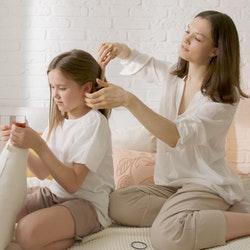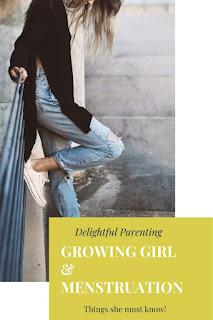Puberty is a sensitive phase in your little girl's life when she is going through massive changes; physically, emotionally, and physiologically. The onset of periods can be confusing and even scary for growing teens. Therefore, you must prepare her for the first monthly period with the correct information. It will help her understand what is going through her body, and there is nothing to be scared of.

Growing girl and Menstruation- what she should know?
Understanding the connection between a growing girl and menstruation beforehand can help her combat social taboos and avoid false information that may hurt her mental well-being.
Top Things She Must Know About Menstruation
Here are top things she must know about her first periods:
Menstruation is a Natural Phenomena
Make sure that your daughter understands menstruation as a natural cycle of growing up. She should see the onset of her periods as a natural process that happens with every girl between 9 and 16. Let her know how natural chemicals called hormones influence the physiology of a female body to cause monthly periods.
It is the best time to familiarize her with the female reproductive system and how it changes at the onset of puberty. Help her relate the changes to the other apparent physical changes in her body, such as acne, excess sweating, and hair growth on different body parts as she grows from a child to a teen and eventually into an adult.
Related Post- Treatment of Acne in Kids

Menstruation Doesn’t Make You Sick
One myth about a growing girl and menstruation is that she can no longer enjoy her normal life as a teen. Ensure your daughter understands that menstruation is not a sickness, but a healthy phenomenon of being a woman. It should not interrupt her normal life or influence her day-to-day activities.
She can still go to school, participate in sports, indulge in extracurricular activities, eat, drink, and play with her friends, and attend social gatherings.
Menstrual Cycles Can Be Irregular at First
Once your daughter knows the physiological changes behind menstruation, tell her to observe the small changes to understand how her body works. She may not have had a regular monthly pattern in the beginning.
Once she knows her menstrual cycle, she can predict her period, stay prepared, and keep an extra pad in her school bag when needed. Such preparedness will save her from unpredictable circumstances and unnecessary turmoil.
Gourmet Cookies
Menstruation May Affect Emotional Well-Being
Realize that hormonal changes during menstruation not only cause physical changes but affect how your daughter feels. You must help your growing girl understand that the roller coaster of emotions she feels, is natural during puberty.
Some girls feel afraid of the changes in their bodies, others feel excited about the same. Some teens feel awkward and confused, while others show mixed emotions.

During puberty, a girl needs your support the most!
At some moment, your child may feel like laughing and crying the next. Sometimes, your little girl may feel angry and agitated. One day she may behave maturely and act childish the very next. Some teens also feel attraction towards the opposite gender.
All these changes can be confusing and overwhelming. Your child must know that she is not alone going through this transition in her life, and there is no reason to be afraid or ashamed of these changes. Make her comfortable so that she can come and talk to you whenever she feels disoriented.
Related Post- Quick Stress Busters for your Children
Menstruation Can Be Painful
Menstruation is often accompanied by painful cramps and discomfort, which may vary from girl to girl. Many times, the pain gets relieved by a short walk, mild exercise, proper sleep, and ample water intake. Gentle pain medicines can help ease the pain. However, if the bleeding is too heavy for too long or the cramps are unbearably painful that your girl cannot sit or stand, you should immediately seek medical attention.

As important as it is to take good care of your daughter during puberty, it is equally important to make her understand how she can take care of herself throughout life. Let her know about the dos and don’ts of menstruation. She should know the importance of adequate sleep, healthy food, an active lifestyle, and exercise during puberty and throughout life.
